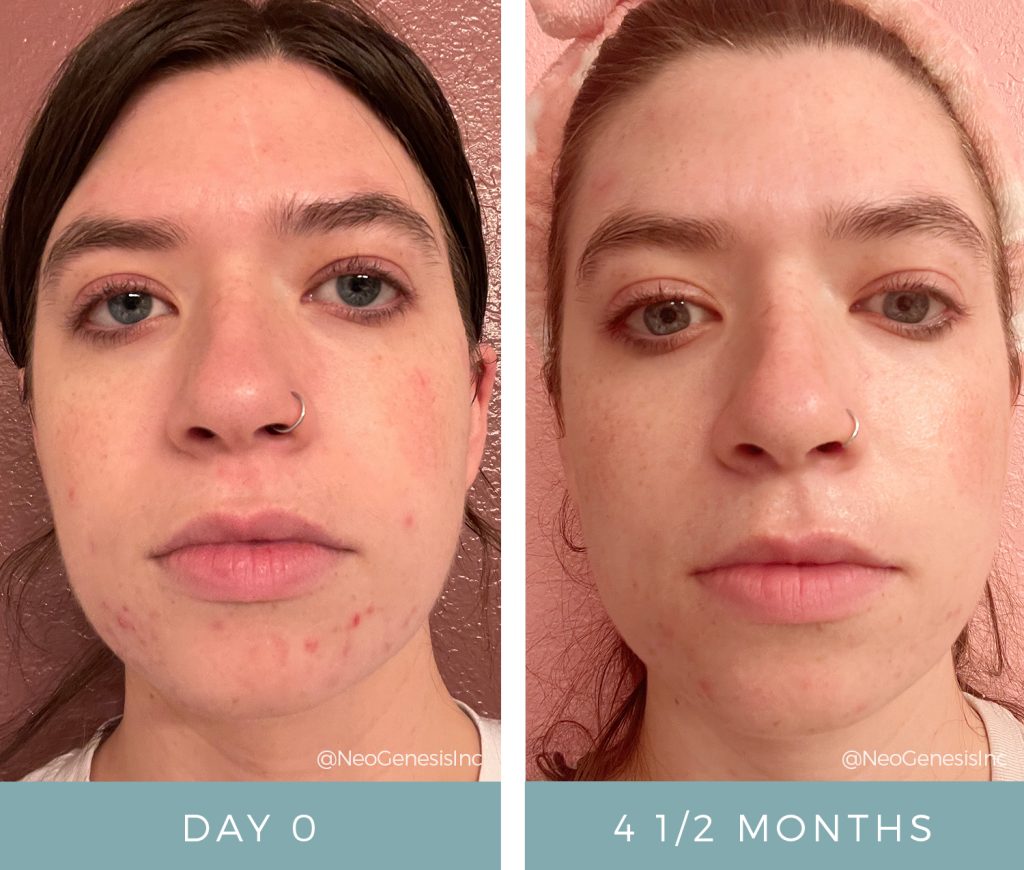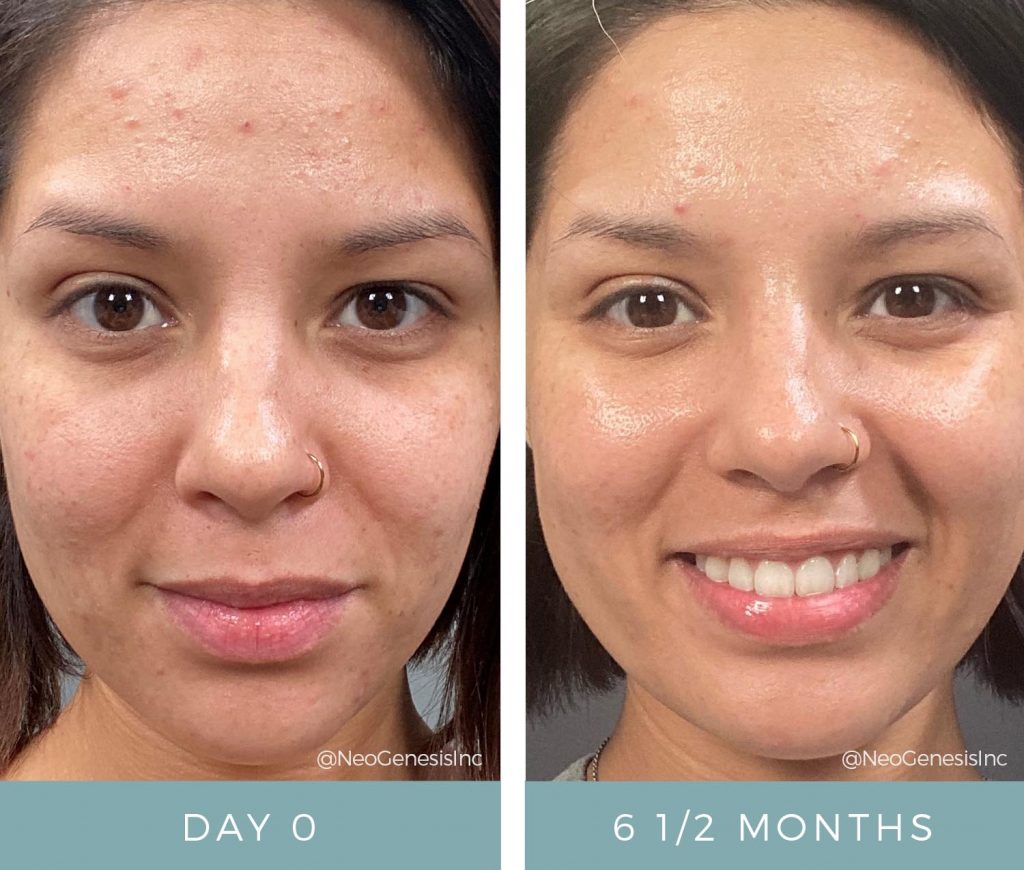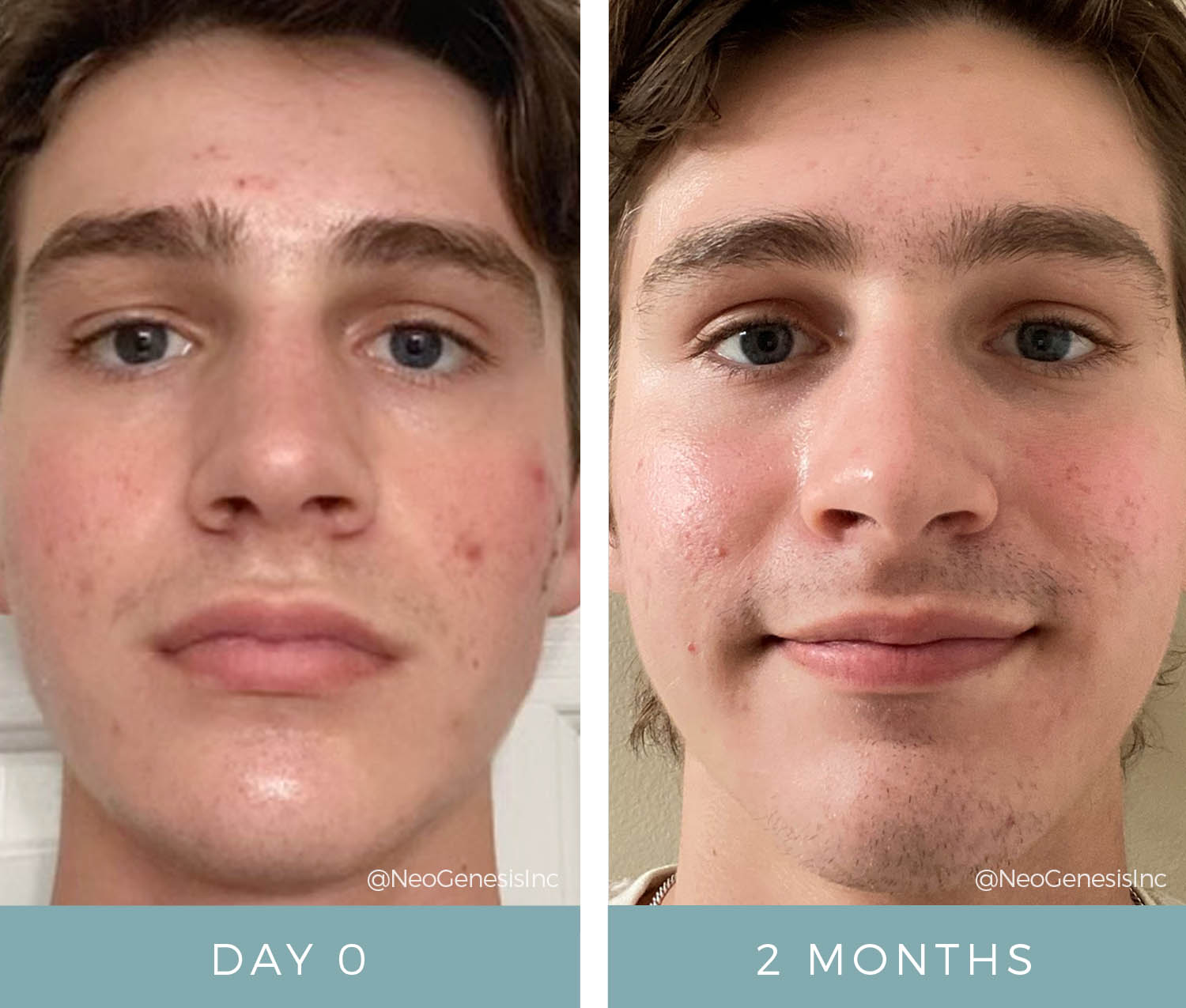Acne

“CH started getting acne when COVID started. He had never had acne or even had a pimple before. He thinks it started once he was wearing a mask (maskne). His main concern is the PIH and sees the marks from a year ago.
In just 2 months the scarring has improved dramatically. The redness he had before using the NeoGenesis products has gone down. CH looks forward to seeing how his skin improves in the days to come.”
PRODUCTS USED:
Cleanser, Recovery, Barrier Renewal Cream, MB-1, Salicylic Acid Gel, Mandelic Acid 8%
PROTOCOL:
Cleanser, Recovery (AM)
Barrier Renewal Cream, MB-1 (AM for 2 weeks)
Cleanser, Recovery (PM)
Salicylic Acid Gel (spot treatment) or Mandelic Acid 8% (PM)
FEATURED VIDEOS
ACNE + MASKNE + PIH + ACNE SCARRING
Acne is a common skin condition that affects many individuals, regardless of age or gender. Acne from wearing face masks, also known as “maskne”, has become a common issue for many individuals in the midst of the COVID-19 pandemic. As more people are required to wear face masks for extended periods of time, they may experience an increase in acne breakouts. This is due to a combination of factors such as increased heat and humidity under the mask, friction from the mask rubbing against the skin, and trapping of oil, sweat, and bacteria on the skin’s surface.
Maskne can manifest in different forms such as whiteheads, blackheads, and even cystic acne. It primarily affects areas that are covered by the mask, such as the chin, cheeks, and bridge of the nose. Individuals who already have existing acne may experience worsening of their condition, while others who have never had acne before may suddenly develop it from wearing face masks.
Aside from the physical discomfort and appearance of maskne, another concern is post-inflammatory hyperpigmentation (PIH) and acne scarring. PIH refers to dark spots or patches that appear on the skin after inflammation or injury has occurred. In this case, the constant rubbing and friction from wearing face masks can cause irritation and inflammation, leading to PIH in individuals with darker skin tones. Meanwhile, acne scarring occurs when ongoing inflammation damages the deeper layers of the skin, resulting in permanent scars.
To prevent maskne and its potential consequences such as PIH and acne scarring, it is important to practice good skincare habits. This includes washing your face before and after wearing a mask, using a gentle cleanser and moisturizer, avoiding harsh skincare products, and choosing masks made of breathable materials. It is also crucial to take breaks from wearing masks whenever possible and to switch to a clean or disposable mask regularly.

“CH started getting acne when COVID started. He had never had acne or even had a pimple before. He thinks it started once he was wearing a mask (maskne). His main concern is the PIH and sees the marks from a year ago.
In just 2 months the scarring has improved dramatically. The redness he had before using the NeoGenesis products has gone down. CH looks forward to seeing how his skin improves in the days to come.”
PRODUCTS USED:
Cleanser, Recovery, Barrier Renewal Cream, MB-1, Salicylic Acid Gel, Mandelic Acid 8%
PROTOCOL:
Cleanser, Recovery (AM)
Barrier Renewal Cream, MB-1 (AM for 2 weeks)
Cleanser, Recovery (PM)
Salicylic Acid Gel (spot treatment) or Mandelic Acid 8% (PM)
FEATURED VIDEOS
ACNE + MASKNE + PIH + ACNE SCARRING
Acne is a common skin condition that affects many individuals, regardless of age or gender. Acne from wearing face masks, also known as “maskne”, has become a common issue for many individuals in the midst of the COVID-19 pandemic. As more people are required to wear face masks for extended periods of time, they may experience an increase in acne breakouts. This is due to a combination of factors such as increased heat and humidity under the mask, friction from the mask rubbing against the skin, and trapping of oil, sweat, and bacteria on the skin’s surface.
Maskne can manifest in different forms such as whiteheads, blackheads, and even cystic acne. It primarily affects areas that are covered by the mask, such as the chin, cheeks, and bridge of the nose. Individuals who already have existing acne may experience worsening of their condition, while others who have never had acne before may suddenly develop it from wearing face masks.
Aside from the physical discomfort and appearance of maskne, another concern is post-inflammatory hyperpigmentation (PIH) and acne scarring. PIH refers to dark spots or patches that appear on the skin after inflammation or injury has occurred. In this case, the constant rubbing and friction from wearing face masks can cause irritation and inflammation, leading to PIH in individuals with darker skin tones. Meanwhile, acne scarring occurs when ongoing inflammation damages the deeper layers of the skin, resulting in permanent scars.
To prevent maskne and its potential consequences such as PIH and acne scarring, it is important to practice good skincare habits. This includes washing your face before and after wearing a mask, using a gentle cleanser and moisturizer, avoiding harsh skincare products, and choosing masks made of breathable materials. It is also crucial to take breaks from wearing masks whenever possible and to switch to a clean or disposable mask regularly.







